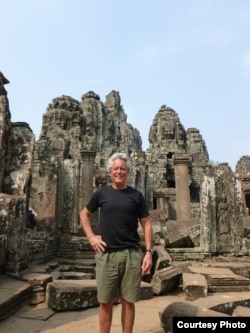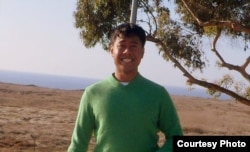As a Holocaust survivor with a deep interest in Southeast Asia, Robert H. Lieberman has striven to bring the tragedy of Cambodia’s past to the next generation.
The physicist with a passion for the arts has recently released a new documentary, “Angkor Awakens: A Portrait of Cambodia”, which premiered in Washington, D.C., on May 7.
The packed screening received a positive reception and Lieberman hopes it will spur further discussion of the Khmer Rouge regime in Cambodia.
The film features a rare interview with Prime Minister Hun Sen, whose more than three decades in power have been beset by criticism over human rights violations, including forced disappearances, murder, torture and illegal land grabbing.
Bobby Bywater, 68, who attended the screening and works for a major American airline, said he thought the film was “well done”.
“The cinematography was beautiful. The landscape of Cambodia can only be so special. The smiling people. I thought it was fair and accurate. And they even have Hun Sen making comments, which was a reason I wanted to see it here... I enjoyed it,” he said.
Bywater said he had studied the secret U.S. bombing campaign against Cambodia, which some have argued was a key factor in the rise of the Khmer Rouge. “The Khmer people have suffered. It is a very touching and difficult thing for me... to see the folks in the country’s side and to hear some of the personal stories. I thought it was terrific.”
Theodore Christov, a Georgetown University professor of history, said he wanted to see the film following a recent visit to Cambodia that further fueled his interest in the country.
“I was drawn to the cultural treasures in Cambodia, Angkor Wat and these places. But I didn’t know much about the political situation and I wanted to hear more about the context of the war,” he said.
Christov, a Bulgarian who had lived under communism in his home country, said he was shocked by the levels of internecine conflict in Cambodia’s history.
“We have our own history with communism and the atrocities of that. So it was very interesting to see this perspective. So one part of the movie that I find interesting was the genocide committed by Khmer against Khmer, which is very unusual,” he said.
Brian Eyler, director of the Stimson Center’s Southeast Asia program, said the documentary also exposed contemporary conflicts over land.
“What I was impressed by is that there’s a lot of archival footage of the recent happenings in Cambodia, such as protests and security attacks on people who are being evicted from their land,” he said.
“But I think there are still many people mobilizing, doing a lot of interesting campaigns on human rights and non-violent campaigns, especially with the land grabbing.”
Chanda Choun, a Cambodian-American viewer, said Angkor Awakens had inspired him to learn more about his country’s past.
“I think the documentary did a great job in showing what happened in Cambodia, the Khmer Rouge period, what led up to it and why Cambodia has gotten there,” he said.
“I think it's a great piece of education and a great piece to show the audience globally about what happened in Cambodia and what's happening now.”
“At the same time, it just scratched the surface of what happened. I'm still left with the feeling that we need to explore more about why the genocide happened, why the people are the way they are before well get any closure.”
Phounam Pin, 25, a Cambodian student at Montgomery College, echoed Choun’s sentiments.
“It’s really sad, but also I learned a lot from the film. As many young Cambodians, I am also confused by the history of my own country,” she said. “But I am very optimistic about the future of Cambodia. Even though it is hard, I’m sure it will be different.”
More than two-thirds of Cambodians are under the age of 30 and people have never had such a high level of access to information with the spread of mobile technology. But Sebastian Strangio, author of “Hun Sen’s Cambodia”, says there is still a long way to go for young Cambodians to achieve meaningful political and social reforms.
“The young generation have a clear sense for change, but they haven’t had a clear idea of exactly how yet. So the challenge for this generation is to articulate some more concrete and specific political demands of their government.
“It is not going to change Cambodia overnight, but that dawning awareness is an important part of the creation of democratic society. We need to have democratic citizens before we have a democratic society.”










